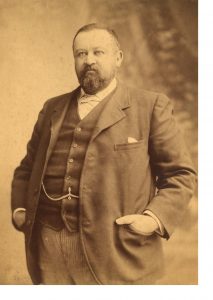Dr William Snowball
 Dr William Snowball was born in Melbourne in November, 1853, to John and Catharine Snowball, who were recently-arrived immigrants from England. After completing his early education at Wesley College and Melbourne Grammar School, Dr Snowball studied medicine at The University of Melbourne, graduating in 1875. He then travelled abroad to continue his studies at University College, London, and the College of Surgeons, Edinburgh. Dr Snowball gained experience at The Great Ormond Street Hospital for Children, London, where he was able to devote his attention to the study of diseases affecting children.
Dr William Snowball was born in Melbourne in November, 1853, to John and Catharine Snowball, who were recently-arrived immigrants from England. After completing his early education at Wesley College and Melbourne Grammar School, Dr Snowball studied medicine at The University of Melbourne, graduating in 1875. He then travelled abroad to continue his studies at University College, London, and the College of Surgeons, Edinburgh. Dr Snowball gained experience at The Great Ormond Street Hospital for Children, London, where he was able to devote his attention to the study of diseases affecting children.
Upon his return to Melbourne in 1878, Dr Snowball was appointed the position of resident doctor at The Children’s Hospital – this was the beginning of his long involvement with, and influential contributions to, the hospital and its efforts. In 1882, Dr Snowball founded his own private paediatrics practice in Carlton and transitioned to the role of Honorary Consultant to The Children’s Hospital, a role he retained until his death in 1902. During these years, Dr Snowball established himself as a prominent paediatrician as he worked to improve accommodation and hygiene conditions for children in medical care, training structures for nursing staff, and research into diseases afflicting his patients.
Epidemics plagued Melbourne’s children and diseases were difficult to diagnose due to lack of research and similarity of symptoms. Dr Snowball advocated for research into diphtheria, a disease that caused particular alarm for medical staff. He promoted the use of a diphtheria antitoxin, which resulted in a decline in the number of diphtheria occurrences. Dr Snowball pushed for accommodation improvements in the hospital wards in aid of improving hygiene standards and preventing infections, which were a constant threat. He insisted on a separation of the outpatient and inpatient blocks and emphasised the need for sunlight to reach the rooms and patients. Nurse training was formalised under Dr Snowball as he advocated for better teaching structures and encouraged skills-growth for nurses. Under Dr Snowball’s influence The Children’s Hospital nursing school grew an excellent reputation.
As a physician, Dr Snowball was described as an ‘all-rounder’ who was beloved by patients and their parents for his jovial nature. Dr Snowball was celebrated for his skills of observation and mastery of medical knowledge that enabled him to accurately diagnose and treat his patients.
A true pioneer for the paediatric profession, Dr Snowball’s early death at age 47 was considered a loss for the nation.
